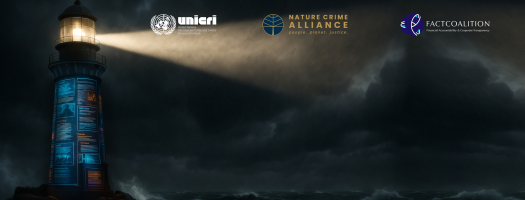
29 September 2025 - 1 October 2025 (half-day sessions: 8:00–12:30 a.m. EDT)
Environmental crimes are among the most complex and rapidly evolving forms of criminal activity today. They often span multiple jurisdictions, involve transnational networks, and intersect with other serious crimes such as corruption, fraud, and trafficking. The impacts are far-reaching: from accelerating climate change and biodiversity loss to threatening public health, security, and the livelihoods of vulnerable communities. Despite their severity, these crimes are often underreported or misunderstood.
Accurate, responsible, and well-informed journalism plays a crucial role in uncovering environmental crimes, raising public awareness, and holding perpetrators to account. Supporting media professionals with the tools and knowledge to report on these issues is essential to promoting transparency, strengthening environmental justice, and fostering effective policy responses.
To this end, the Nature Crime Alliance Secretariat, the Financial Accountability and Corporate Transparency (FACT) Coalition, and the United Nations Interregional Crime and Justice Research Institute (UNICRI), in collaboration with key Alliance members and media associations, will deliver a free training programme for journalists and communication professionals (press officers, social media managers, institutional communicators, and other communication professionals). The course will focus on environmental crimes that pose growing safety and security risks around the world, offering a multidisciplinary approach to understanding their dynamics and improving media responses.
Among the high-level speakers featured in the training are:
Katy Carroll, UNICRI CBRN Risk Mitigation and Security Governance Unit.
Michela Corvino, Earth Observation Security Applications Engineer, European Space Agency (ESA)
Mariana Diaz Garcia, UNICRI CBRN Risk Mitigation and Security Governance Unit.
Emily Fishbein, Freelance journalist focusing on Myanmar. Current Pulitzer Center Rainforest Investigations Network Fellow.
Dr. Meredith Gore, Professor and Research Director, University of Maryland
Francesco Marelli, Chief, UNICRI CBRN Risk Mitigation and Security Governance Unit.
Ruth Noguerón, Senior Associate, Global Forest Watch and Forest Governance and Policy, World Resources Institute (WRI).
Bruce Ohr, Chief Judicial Strategist, International Wildlife Trust
Dr. Louise Shelley, Omer L. and Nancy Hirst Endowed Chair and University Professor at George Mason University; Founder of the Terrorism, Transnational Crime and Corruption Center (TraCCC)
David Taylor, Fulbright U.S. Scholar, Johns Hopkins University
Julia Yansura, Program Director, Environmental Crime & Illicit Finance, The Financial Accountability and Corporate Transparency (FACT) Coalition
The training will explore how organised criminal networks profit from and facilitate nature crimes, and will examine the financial mechanisms that support these operations- such as money laundering, corruption, and the abuse of secrecy jurisdictions. Participants will gain practical insights into tools and approaches drawn from intelligence analysis, financial journalism, and conservation criminology. They will learn to use scientific data, digital tools, and open-source technologies to track crime patterns, monitor environmental harm, and inform evidence-based storytelling.
Through practical sessions, participants will also strengthen their ability to conduct interviews with diverse sources - including scientists, prosecutors, law enforcement officers, and environmental defenders - while maintaining ethical and professional standards. The course will further address the growing threat of disinformation in environmental reporting and offer strategies to identify and counter false or misleading narratives.
By the end of the course, participants will be better equipped to investigate and report on local and global environmental threats with rigour, clarity, and impact. The training also seeks to build lasting connections among participating journalists and experts. In the spirit of applying the skills acquired, participants will be encouraged to develop a story or media product on environmental crime within the year following the course.
A certificate will be awarded upon full completion of the training.
To apply for the training, please send an email to marina.mazzini(at)un.org with a short CV and a brief statement of interest explaining your motivation to participate and how the training could support your professional work.
Other events
5th Global Meeting on Artificial Intelligence for Law Enforcement, Curitiba, Brazil 26-28 August 2025, organized by INTERPOL, UNICRI, the Federal Police of Brazil (PF) and Fundação Justiça pela Ciência.
Africa Shield 2025: Strengthening Counterproliferation Efforts Across Africa, Rabat, Morocco, 4-6 August 2025, organized by DTRA's International Counterproliferation Program (ICP), in partnership with the European Union Chemical, Biological, Radiological and Nuclear Centres of Excellence (EU CBRN CoE) and UNICRI.
Regional training in Argentina to law enforcement on the use of AI and related technologies to combat child sexual exploitation and abuse, Buenos Aires, Argentina, 26-27 June 2025 (in cooperation with the Ministry of Interior of the United Arab Emirates (UAE) and the Public Prosecution Service of the Autonomous City of Buenos Aires).
Reaching the Midpoint: A Time for Reflection and Dialogue - UNICRI’s Consultation with Member States, UN HQ New York, 12 June 2025
Culture of Legality: The Province of Caserta for a New Model for International Development Caserta, Italy Thursday, 29 May, 2025
Side Event at the 34th Session of the Commission on Crime Prevention and Criminal Justice (CCPCJ): Frontier Technologies and Criminal Justice: Human Rights Implications in Focus, Vienna International Centre and Online, 22 May 2025
Organised by the Permanent Mission of Antigua and Barbuda to the United Nations in Vienna with the support of France, the UNODC Crime Prevention and Criminal Justice Section (CPCJS) and the United Nations Interregional Crime and Justice Research Institute (UNICRI).
Side Event at the 34th Session of the Commission on Crime Prevention and Criminal Justice (CCPCJ): Crimes That Affect the Environment – Launch of the Minerals Crimes Study, Vienna International Centre and Online, 20 May 2025.
Organised by UNODC Research and Trend Analysis Branch with the support of France, Peru and UNICRI
Side Event at the 34th Session of the Commission on Crime Prevention and Criminal Justice (CCPCJ): Addressing new, emerging, and evolving forms of crime, including crimes that affect the environment, smuggling of commercial goods, and trafficking in cultural property and other crimes targeting cultural heritage, Vienna International Centre and Online, 19 May 2025.
Organised by the United Nations Crime Prevention and Criminal Justice Programme Network Institutes (PNI)